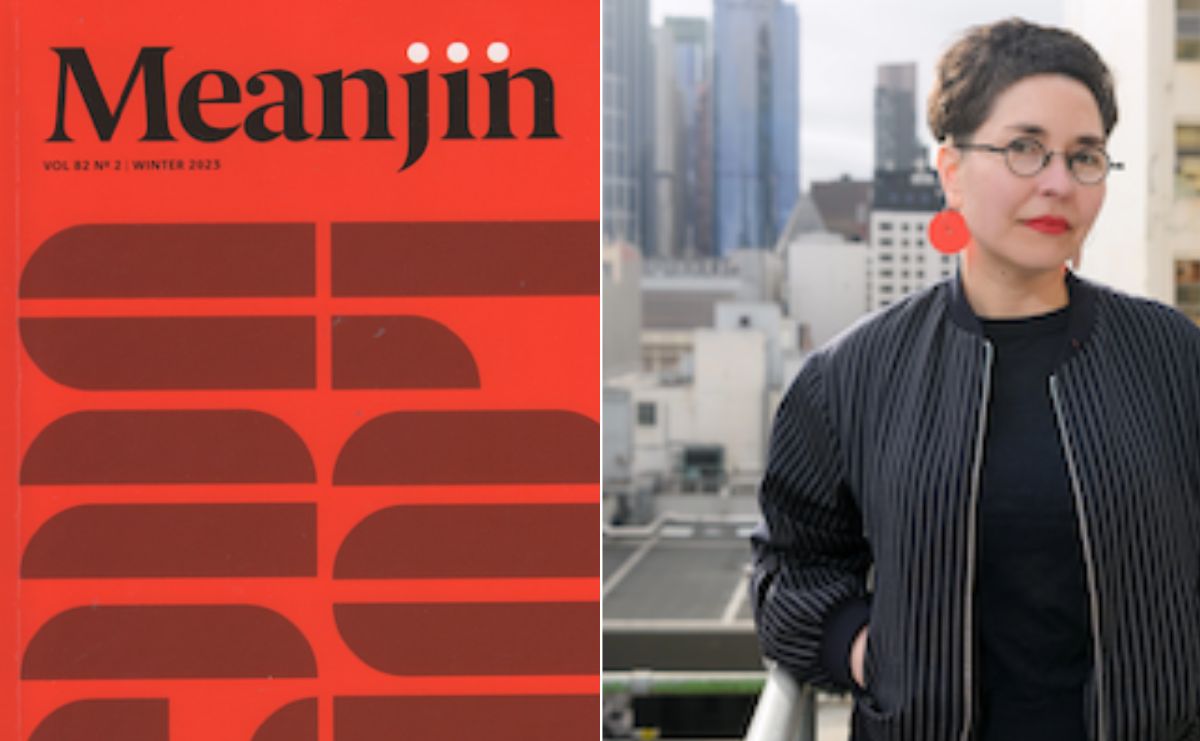‘I look forward to the daily learning and deep invigoration that comes from working with Australia’s most adventurous writers,’ said Esther Anatolitis on being appointed editor of Meanjin in succession to the distinguished Jonathan Green. This is the first edition of Meanjin in the new design by Stephen Banham. She has declared that it is a must-have edition ‘where we continue to reinterpret Founding Editor Clem Christesen’s commitment ‘to make clear the connection between literature and politics’.
Reader, you will not be disappointed. But remember, this is a magazine, not a book, and as such contains a diverse set of features, not all of which will be of equal interest to everyone. The various sections are clearly identified in the index and the pages on which the individual contributions appear are tastefully colour-coded. This is the work of well-regarded typographer Stephen Banham, who also contributes an interesting article on the topic. There is a new attractive typeface (Berlingske), which is easy on the eye though, at 8pt, the useful marginal notes, which thankfully take the place of footnotes, may be a little hard to read for older readers.
There is something alluring about a large hamper filled with both useful and luxury items beautifully presented. This edition of Meanjin is the literary version of such a basket – full to overflowing. While the contents may be too rich to be consumed in one greedy, lengthy sitting, they need to be, and deserve to be, savoured over time and some, not least the poems, perhaps revisited more than once.
The lead essay of this edition, the so-called ‘Meanjin Paper’, is by Gaja Kerry Charlton titled ‘Makunschan, Meeanjan, Miganchan, Meanjan, Magandjin’. She dwells on the importance of language and delivers a masterclass on the subject from the point of view of her First Nations contemporaries. In addition, there are three essays about current affairs appropriately grouped under the heading ‘State of the Nation’, which deal respectively with the Voice referendum, access to medical care and climate change. It would be difficult to find more important contemporary themes than these.
In political terms, while these articles are most unlikely to meet Peter Dutton’s approval, they are by no means uncritical of those politicians currently in office. The issues are well-argued and persuasive. Whether this is preaching to the converted is another matter although, for example, Jo Dyer questions whether this ‘government will rise to the wretched challenges confronting our planet’ and reminds the readers of the “Overton window“, which readers well-versed in political jargon will recall is the term used for the range of policies politically acceptable to the mainstream population at a given time.
There is a further group of a dozen essays, each of which deserves at least as much commentary as Charlton’s contribution. Obviously, that is not possible in a review such as this. What can be said is that they are topical. Subjects include voting for the Voice, COVID-related experiences, the reasons Australia should become a republic and what governing boards should be about. In one of these essays, ‘An Elegant Revenge: Language at Play’ Lur Alghurabi writes: ‘One of my worst biases as a reader is that I think all good work is actually non-fiction and that only non-fiction makes for good work. Whenever I read good fiction, I do the mental gymnastics necessary to reframe it, for myself, as a real story.’
I don’t know what she would make of the four pieces of fiction in this edition. Certainly, Dan Hogan’s spoof in their ‘I named her naturally because I love castles’ – in which they describes an equation ‘where L is the teapot’s size, and I is the second moment of area for the modified forks…‘ – would be a challenge. But whether or not you prefer non-fiction to fiction, the four short stories in this issue are worthy of your attention and all present, as good fiction does, insights into contemporary reality.
As if all this is not enough, there are a number of excellent lengthy book reviews, essays in themselves, much like those in The Times Literary Supplement, reviews which I often thought were more interesting than the books that were their ostensible subject matter.
And the reader is blessed with three pieces under the heading ‘Experiments’. One of these consists of a single page of some Zs, lots of Os and some Ms printed in bold and forming a not unattractive pattern. The other two “experiments” are less unconventional.
Another welcome addition in this issue is an interview with Maxine Beneba Clarke. It reveals much about this wonderful and gifted person. It also explains how we came to read some of her poems in a newspaper and why she is so prolific on Twitter.
Read: Book review: A Real Piece of Work, Erin Riley
Overall, the underlying vibe of the Winter 2023 edition of Meanjin is one of tremendous energy. There is an increased emphasis on the affairs and well-being of Australia’s First Peoples and Meanjin comes across as intensely topical. While it is hardly surprising that each of the individual contributors has their own voice, they share an intensity that creates a sense of urgency in the reader. If anything, the high standards of past issues of Meanjin have been exceeded.
Meanjin: Winter 2023, edited by Esther Anatolitis
Format: Paperback
Release date: 15 June 2023
RRP:$24.99





